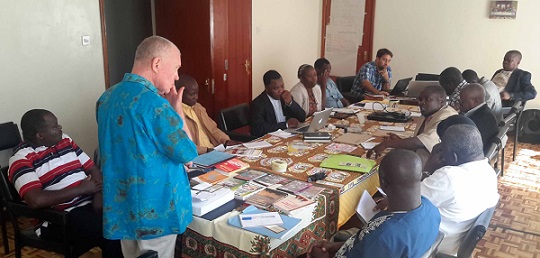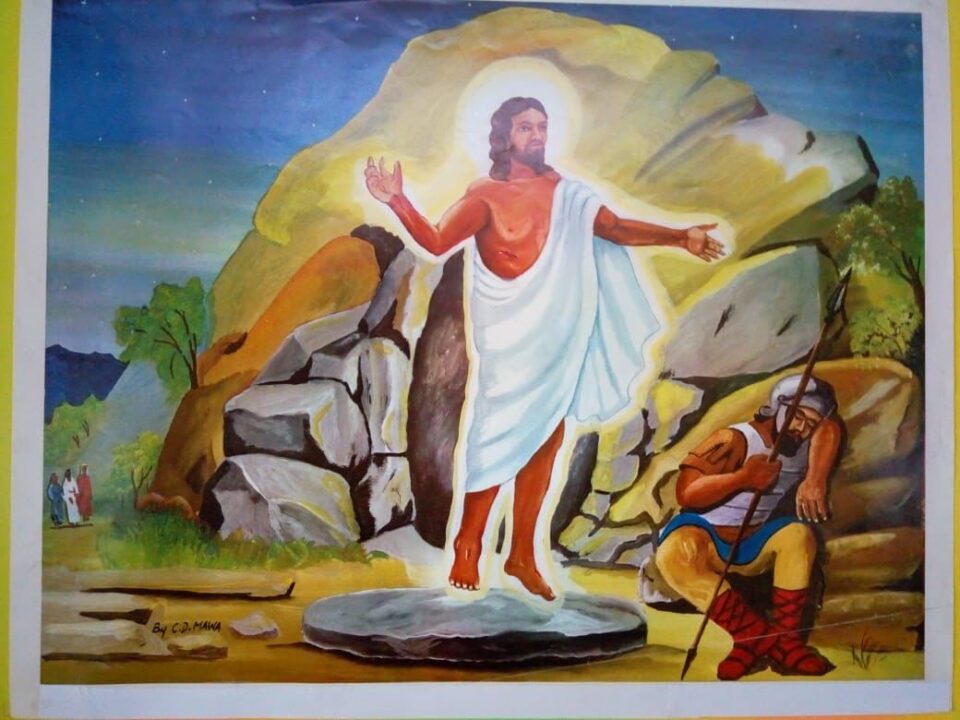- Contact us on - Contactez-nous sur - Contacte-nos em
- +233-30-277-8867/8
- +233-30-277-2548
- secam@secam.org
Developing Guidelines and Research on Small Christian Communities in Africa among Recommendations of Nairobi Meeting
Developing Guidelines and Research on Small Christian Communities in Africa among Recommendations of Nairobi Meeting
CANAA || By Father Don Bosco Onyalla, Nairobi || 27 October 2016
 Participants at the just concluded Pan-African meeting on Small Christian Communities (SCCs) would like Bishops’ conferences in Africa to develop guidelines on SCCs and institutional of higher learning to get involved in research on and promotion of SCCs on the continent.
Participants at the just concluded Pan-African meeting on Small Christian Communities (SCCs) would like Bishops’ conferences in Africa to develop guidelines on SCCs and institutional of higher learning to get involved in research on and promotion of SCCs on the continent.
The meeting was a follow up of two previous workshops, the first held in Ghana’s capital, Accra in 2014 and the second in Ouagadougou, Burkina Faso.
The participants agreed to start an independent African SCCs Networking Website with its own domain name under the address: www.africansccsnetworking.org
Other recommendations included the formation of a steering committee to spearhead the networking of SCCs on the continent and beyond, writing of articles on SCCs, and a theological appraisal of SCCs in the modern world.
The Missio-sponsored meeting brought together sixteen participants from seven countries. They made presentations on SCCs from their respective local churches and discussed the achievements and challenges of SCCs on the continent.
The participants expressed their commitment to realizing the Pan-African network of SCCs through annual meetings as well as the sharing of “best practices through social media and Internet.”
Below is full text of the communique issued at the conclusion of the meeting
COMMUNIQUE OF THE 3RD PAN-AFRICAN WORKSHOP ON THE FOUNDING OF A NETWORK OF SMALL CHRISTIAN COMMUNITIES IN AFRICA HELD IN NAIROBI-KENYA (21st to 25th OCTOBER, 2016).
PREAMBLE
We, participants of the Pan-African Workshop on the Founding of a Network of Small Christian Communities in Africa assembled at “Des Places House” (Provincial House of the Spiritans) in Nairobi – Kenya, from 21st to 25th October 2016, to share our experiences and evaluate the situation of the Small Christian Communities as a Pastoral priority in Africa and beyond.
Sixteen participants from seven countries attended the workshop. These included Rt. Rev. Method Kilaini (Auxiliary Bishop of Bukuba diocese-Tanzania), Michael Meyer (Missio – Germany), Fr. Emmanuel Chimombo (AMECEA- Pastoral department), Fr. Charles Odira (KCCB – Commission for Pastoral and Lay Apostolate), Ronald Sunguti (Nakuru-Kenya), Michael Orondo (Nairobi-Kenya), Fr. Stephen Mukami (Nairobi-Kenya), Fr. Vincent M. Elimah (Spiritan – Kenya), Fr. Noel Mpati (DRC), Sr. Jose`e Ngalula (DRC) Sam Yacinthe (Burkina Faso), Confe` Bernadette (Burkina Faso), Fr. Alfred Chaima (Blantyre -Malawi), Fr. Justin Matepa (ZCCB-Zambia), Fr. Stefano Kaombe (Tanzania) and Fr. Joseph Healey (Maryknoll-Kenya) .
The following were the presentations at the Seminar:
- Keynote Address by Right Reverend Method Kilaini
- Background of the Pan African Workshop Network of Small Christian Communities- by Mr Michael Meyer
- Progress of the Network of Small Christian Communities since its launch in 2014 in Accra- Ghana by Fr Joseph Healey
- Experiences of Small Christian Communities from each member country
- Experiences from St. Kizito Small Christian Community of St. Austins Parish-Nairobi, Kenya-by Mr Michael Orondo.
The aims of this workshop were:
- to evaluate the situation of the Small Christian Communities in Africa and to look for ways of promoting them in the continent and beyond
- to share best practices while learning from our challenges
- to form a Pan- African Network of Small Christian Communities in Africa
OBSERVATIONS
On the basis of the various presentations and general discussions participants observed both fruits and challenges:
Some fruits of Small Christian Communities:
- 1.They represent the Church as a communion of faith, hope, love and unity among the people of God
- 2.They are vital cells of evangelization, a field of inculturation and localization of the church
- 3.SCCs have improved means of communication within the church structure
- 4.They have deepened knowledge of Scripture for Christ’s faithful
- 5. They have reinforced the role of the laity in decision making
- 6. They actualized self reliance by promoting a self propagating, self ministering and self supporting church at grassroots
- 7.They are venues for building strong leadership of the laity
- 8.They are an easy and authentic way of promoting sacramental life of the people of God
- 9.They provide a wider base for active participation of the laity in church
- 10.They promote good relations with other religions and denominations
Some Challenges of Small Christian Communities
1. Size of the SCCs: Most SCCs are too big to deserve the name Small Christian Community. Consequently, there is no adequate mutual support given the members
2. Illiteracy: Rural areas are largely non-literate. Such people are at the mercy of their literate neighbors
3. Ignorance of the Social Teaching of the Church renders the faithful vulnerable to Pentecostalism
4. Indifference by some priests: Some priests do not show any interest in SCCs, hence activities in such SCCs go unmonitored and the faithful become demotivated
5. Monotony of programmes makes SCCs boring, leading to loss of enthusiasm and interest
6. Money demanding: Some Small Christian Communities have become money-collecting centers for the parish. With time the faithful get fed up and start shunning the meetings
7. Exclusion of Children and the Youth: Most activities laid out for SCCs do not address the needs of children and the youth
8. Male Absenteeism: Men are less active than women and rarely attend SCC meetings
9. Social status, ethnicity and geographical setting are impediments for regular attendance of some members in SCCs
10. Differences in eligibility for sacraments and Christian burial breed divisions in SCCs
COMMITMENTS
On the basis of the challenges outlined above, participants made the following commitments:
- To form a Pan –African Network of Small Christian Communities
- To promote Small Christian Communities in our countries and bring more members on board
- To support a steering committee that has been selected and mandated to coordinate the networking
- To meet annually on a rotational manner in different countries of Africa
- To share the best practices through social media and internet
RECOMMENDATIONS
With due respect to the recommendations of the previous meetings held in Accra-Ghana and Ouagadougou–Burkina Faso in 2014 and 2015 respectively, the participants agreed:
- To start an independent African SCCs Networking Website with its own domain name. The internet address is: www.africansccsnetworking.org. It should include the Missio SCCs Network logo. The website will have dialogue/discussion pages in English, French and Portuguese. This will be a revised and updated version of the “original, temporary” African SCCs Networking Website (what we call the trial or Beta version) created in April, 2016 that has the internet address (URL): http://www.topsoftchoice.com/secam_scc/
- To mandate the AMECEA Pastoral department to manage this newly created website on SCCs Networking
- To encourage people from all 54 countries in Africa to send articles on SCCs
- To form a steering committee of a sizeable number to spearhead the network on SCCs
- To encourage conferences to develop guidelines on SCCs
- To involve institutions of higher learning in research and promotion of SCCs
- To make theological appraisal of SCCs in the modern world
- To emphasize on statistical data as an authentic tool for pastoral planning.
CONCLUSION
In all these we recognize the blessing of God in the fruitful work realized during the workshop.
We are grateful to the Superior and the entire community of the Holy Ghost Fathers at “Des Places House” for according us a conducive environment to hold our workshop.
We also wish to express our gratitude and appreciation to our Partner Agency Pontifical Mission Society-Missio Aachen, the Local Organizing Committee, the presenters and the various groups and individuals for their invaluable contributions.
We are indebted to bishops, superiors and families for responding positively to the invitations we sent by sending participants to this workshop.
We finally thank the participants for coming and for their active participation.
We entrust the fruits, commitments and recommendations of this workshop to the Blessed Mary ”Mother of God’s Word” and “Mother of Faith”, “the one in whom the interplay between the word of God and faith was brought to perfection”.(Verbum Domini 27).
Signed by:
Rev. Fr. Emmanuel CHIMOMBO
AMECEA PASTORAL COORDINATOR
Given at “Des Places House”-Nairobi, Kenya: Tuesday, 25th October, 2016.

